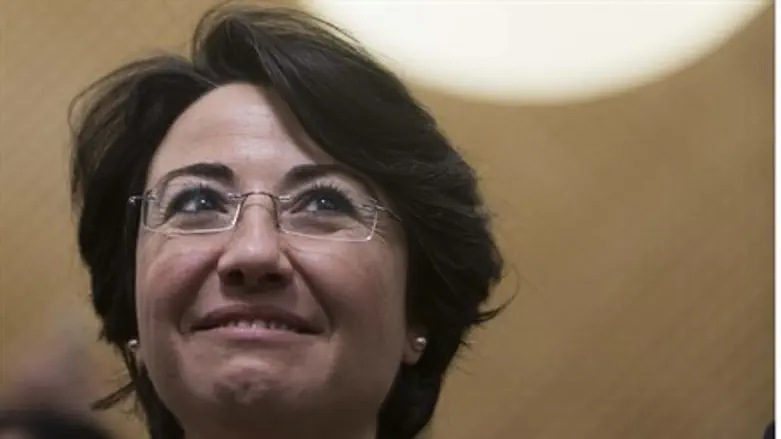
An investigation will not be opened up against MK Hanin Zoabi (Balad), Deputy Attorney General Raz Nizri announced to the Knesset Committee for Interior Affairs Monday - despite widespread condemnation of her comments supporting Hamas terrorism.
According to Nizri, the Attorney General's Office concluded that Zoabi's comments were not incitement "in all its manifestations."
"On the one hand, she did not see the abductors [of murdered teens Naftali Frenkel, Gilad Sha'ar, and Eyal Yifrah, hy"d - ed.] as terrorists; on the other, she always disapproved of the abduction [itself]," Nizri claimed.
Zoabi has been summoned for questioning, however, for remarks she made against police earlier this month at the entrance to the Nazareth Magistrate's Court. The MK responded through representatives, who claim she has "no time" to sit for the police investigation.
Zoabi has been linked to Hamas on multiple occasions, and is infamous for provocative speeches, including one in which she said that Israel has “no right to a normal life” and a later address claiming that “the Israeli occupation” was behind the murder of Israelis in Bulgaria. Recently, she declared that Israel should "thank her" for allowing Jews to live in the Jewish State.
The anti-Israel MK was thrust back into the spotlight last month, after making a series of remarks defending Hamas's horrific abduction and murder of Israeli yeshiva high school students Gilad Sha'ar (16), Naftali Frenkel (16), and Eyal Yifrah (19), hy"d.
In the remarks, Zoabi refused to call their murderers "terrorists" and insisted that the abduction was a "legitimate" way to "fight the occupation."
More recently, Zoabi wrote an article encouraging Hamas on the terror group's website, and was briefly handcuffed during violent pro-Palestinian protests in Haifa.
The latest salvo of verbal fire on Israelis resulted in both a personal and political backlash; Zoabi's family disowned her, passersby confronted her on the street and in restaurants, and the Knesset began several forms of legal proceedings for her ouster, in a bill dubbed "Zoabi's Law."
Before the last elections, the Central Elections Committee banned Zoabi, under a clause requiring candidates and parties not to work against Israel's character as a Jewish, democratic state. However, the Supreme Court later overturned the decision and allowed Zoabi to run.
